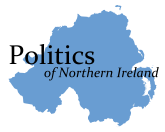- Northern Ireland Belfast Agreement referendum, 1998
-
Northern Ireland 
This article is part of the series:
Politics and government of
Northern IrelandNorthern Irish LawNI in the UKNI in the EU
The Belfast Agreement referendum, 1998 was a referendum held in Northern Ireland over whether there was support for the Belfast Agreement. The result was a majority (71.1%) in favour. A simultaneous referendum held in the Republic of Ireland produced an even larger majority (94.4%) in favour.
Contents
Party support
All the main UK political parties (Labour, Conservative, and Liberal Democrat) supported the Yes campaign, though the local branch of the Conservatives supported the No campaign. Of the local Northern Ireland parties represented in the Northern Ireland Peace Forum, the Ulster Unionist Party, Social Democratic and Labour Party, Sinn Féin, Alliance, Progressive Unionist Party, Ulster Democratic Party, Northern Ireland Women's Coalition and local "Labour" groups supported the proposals.
The only two parties in the Forum to campaign against the Agreement were the Democratic Unionist Party and the UK Unionist Party, though many prominent individuals in the Ulster Unionists also did so. Some minor parties campaigned against it. Republican Sinn Féin, which at the time did not run candidates in Northern Ireland, still opposes the agreement.
In the Republic of Ireland, all parties represented in the Oireachtas were in favour - Fianna Fáil, Fine Gael, Labour, Progressive Democrats, Democratic Left, Green Party, Sinn Féin and the Socialist Party.
Results
The Northern Ireland referendum was held on 22 May 1998. There was a large majority of 'Yes'. A total of 1,738 ballots were spoiled. Turnout, at 81.1% was very high for a developed country where voting is not compulsory.[1] Turnout in the equivalent referendum in the Republic of Ireland was average for a constitutional referendum but returned almost universal approval (94.39%).
The electorate were asked to indicate: Do you support the agreement reached at the multi-party talks on Northern Ireland and set out in Command Paper 3883?
Northern Ireland Belfast Agreement referendum, 1998 Choice Votes Percentage  Yes
Yes676,966 71.1% No 274,979 28.9% Invalid or blank votes 1,738 0.18% Total votes 953,683 100.00% Voter turnout 81.1% The referendum in the Republic of Ireland on the same day, rather than explicitly seeking approval of the Agreement itself, sought endorsement of constitutional amendments required by the Agreement, and produced an overwhelming Yes vote: see Ireland referendum, 1998.
Turnout
The turnout in Northern Ireland was noticeably high at 81.1% and even more remarkably the turnout was quite even throughout Northern Ireland, compared to many elections where turnout is highest in strong nationalist areas and significantly lower in unionist areas. It is estimated that approximately 147,000 people who do not normally vote in elections turned out to vote in the referendum, most of them in traditionally staunch unionist areas. In the Republic the turnout was lower, at 56.3%.[2]
Legislative responses
The UK Parliament passed the Northern Ireland Act 1998, while in the Republic the Nineteenth Amendment of the Constitution Act 1998 passed into law.
References
- ^ ARK: Northern Ireland Elections, The 1998 Referendums
- ^ ARK: Northern Ireland Elections, The 1998 Referendums
See also
Elections and referendums in Northern Ireland Elections Local government elections 1973 · 1977 · 1981 · 1985 · 1989 · 1993 · 1997 · 2001 · 2005 · 2011Referendums 1973 · 1998Devolution in the United Kingdom Commissions Referendums 1979 (Scotland) · 1979 (Wales) · 1997 (Scotland) · 1997 (Wales) · 1998 (London) · 1998 (Northern Ireland) · 2004 (North East England) · 2011 (Wales)UK Parliament Northern Ireland Act 1998, 2006 · Government of Wales Act 1998, 2006 · Scotland Act 1998, Scotland Bill 2011UK Government Departments
Territorial Offices (MOJ)Devolved legislatures
Devolved administrationsElections Related articles Categories:- Elections in Northern Ireland
- 1998 referendums
- Referendums in Northern Ireland
- History of Northern Ireland
- 1998 in Northern Ireland
- History of Belfast
- Northern Ireland peace process
- 1998 in international relations
- 1998 elections in the United Kingdom
Wikimedia Foundation. 2010.
